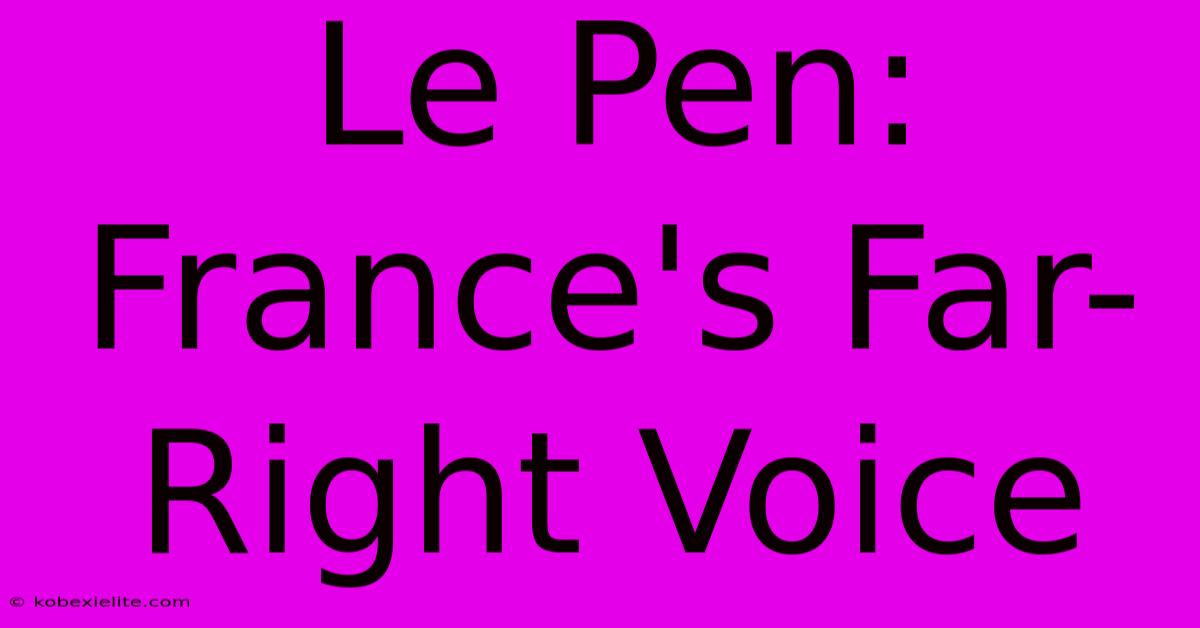Le Pen: France's Far-Right Voice

Discover more detailed and exciting information on our website. Click the link below to start your adventure: Visit Best Website mr.cleine.com. Don't miss out!
Table of Contents
Le Pen: France's Far-Right Voice
Marine Le Pen, a prominent figure in French politics, leads the National Rally (formerly the National Front), a party deeply rooted in France's far-right. Understanding her influence requires examining her political trajectory, ideology, and impact on French society. This article delves into the complexities of Le Pen's political career and her enduring presence on the French political landscape.
The Rise of a Political Dynasty
Le Pen's political journey is intrinsically linked to her father, Jean-Marie Le Pen, the founder of the National Front. He established the party on a platform of staunch nationalism, anti-immigration, and Euroscepticism. Marine, inheriting this legacy, has strategically modernized the party's image, aiming for broader appeal while maintaining its core principles. This calculated evolution has been crucial to her political success. She has skillfully distanced herself from her father's more overtly controversial statements, while still appealing to his loyal base.
From Daughter to Leader: A Strategic Rebranding
Jean-Marie Le Pen's outspoken racism and anti-Semitism significantly hampered the party's prospects for mainstream acceptance. Marine Le Pen recognized this and implemented a significant rebranding effort. She toned down the party's rhetoric, focusing on issues like economic insecurity and national identity, which resonated with a wider electorate disillusioned with mainstream politics. This strategic shift allowed the National Rally to gain traction amongst voters who might otherwise have rejected its far-right ideology. This calculated rebranding has been one of the key factors in her rise to prominence.
Core Tenets of Le Pen's Ideology
While presenting a more moderate image, Le Pen's core ideology remains firmly rooted in far-right principles. Key tenets include:
- Strong Nationalism: A belief in prioritizing French interests above all else, often expressed through protectionist economic policies and a restrictive immigration stance.
- Anti-Immigration: A consistent theme throughout Le Pen's career, often characterized by calls for stricter border controls and a reduction in immigration. This remains a cornerstone of her platform and a powerful rallying cry for her supporters.
- Euroscepticism: A critical stance towards the European Union, advocating for greater national sovereignty and questioning the benefits of EU membership. This sentiment resonates with many French citizens who feel alienated by EU policies.
- Social Conservatism: Emphasis on traditional family values and a rejection of what she perceives as progressive social agendas.
Economic Policies: A Populist Approach
Le Pen's economic policies are presented as populist, promising to protect French workers and businesses from globalization. However, critics argue that her proposals lack economic viability and could negatively impact the French economy. The details of her economic platform are frequently debated and remain a point of contention.
The Impact of Le Pen's Influence
Marine Le Pen's presence has undeniably shifted the French political landscape. Her strong performance in presidential elections, though ultimately unsuccessful, has forced mainstream parties to address issues previously relegated to the fringes of political discourse. Her influence extends beyond electoral results; her presence compels mainstream parties to consider the concerns of her voters. This influence is felt across the political spectrum, forcing a broader conversation about issues such as immigration, national identity, and the role of the EU.
The Future of Le Pen and the National Rally
The future of Le Pen and the National Rally remains uncertain. While she hasn't achieved ultimate electoral victory, her consistent strong showings demonstrate her enduring political relevance. Her ability to continue adapting her message to changing political landscapes will be crucial to her future success. The ongoing debates surrounding immigration, economic inequality, and the future of Europe will continue to provide fertile ground for Le Pen's populist message. Her influence on French politics is undeniable and likely to persist for years to come.
In Conclusion: Marine Le Pen represents a powerful and enduring force in French politics. Her strategic rebranding of the National Rally, coupled with her focus on key issues affecting the French electorate, has solidified her position as a major player. Understanding her ideology and political impact is vital to grasping the complexities of modern French politics.

Thank you for visiting our website wich cover about Le Pen: France's Far-Right Voice. We hope the information provided has been useful to you. Feel free to contact us if you have any questions or need further assistance. See you next time and dont miss to bookmark.
Featured Posts
-
Fan Reaction Hogan Booed In Inglewood
Jan 08, 2025
-
Black Caps Beat Sri Lanka In Hamilton
Jan 08, 2025
-
Why Antonio Pierce Failed Raiders
Jan 08, 2025
-
President Elect Trumps Gulf Vision
Jan 08, 2025
-
Tgl Format Explained Rules And Team Details
Jan 08, 2025
